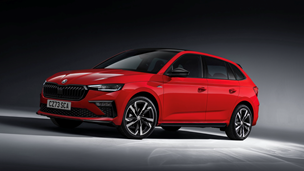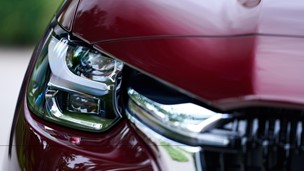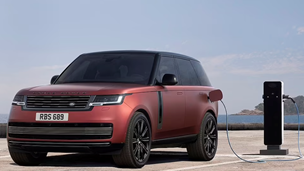Diesel engines were once championed by the press and by the government as the solution to cleaning up the environment, but now they’re castigated as dirty, noxious and even potentially deadly.
Spurred on by tax breaks, motorists across the country once bought up diesel-powered vehicles in their millions, only for the government to turn around and claim that diesel isn’t the answer and could be, in fact, a much bigger problem than anticipated.
But what exactly is the problem with diesel engines, and why, after years of being claimed to be the ‘cleaner’ option, is diesel fuel now being demonised by the press and by politicians?
What’s so bad about diesel?
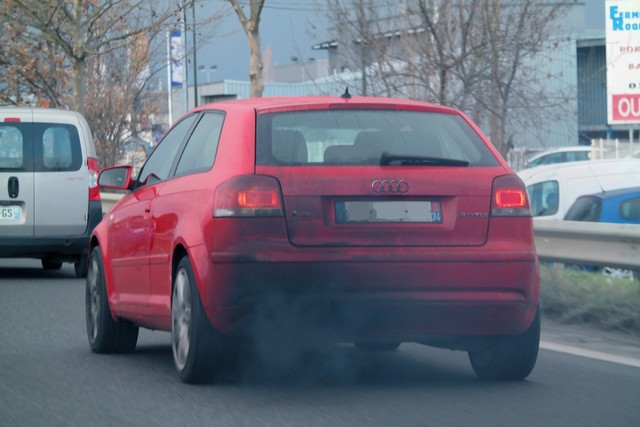
The main concerns regarding diesel-powered cars are all related to pollution, which can have severe consequences for both people’s health and the wellbeing of the environment.
A number of studies have shown that diesel cars, unlike the majority of petrol-powered vehicles, emit high levels of nitrogen oxides and dioxides. Nitrogen dioxide (NO2), is particularly worrisome, as studies have shown that it can cause or worsen health conditions like asthma and bronchitis, while it can even increase the risk of heart attacks and strokes.
According to the European Environment Agency (EEA), many European cities currently have NO2 levels that are well above the EU legal limits, with cities like London, Paris and Munich all reported to have as much as twice the limit.
Not just that, but diesel exhausts have been shown to emit particulate matter, which has been linked to conditions like cancer. While this has been understood for quite a while now and modern diesel cars come fitted with filters to trap poisonous soot, problems still remain.
One of the biggest causes for concern is that many drivers remove the filters on their cars to improve fuel economy and performance, which isn’t illegal to do. NO2 also forms what’s known as secondary particulate matter when it’s released into the atmosphere, which can cause acid rain amongst other problems.
How many people could it affect?

Estimates suggest that air pollution as a whole causes hundreds of thousands of premature deaths in Europe, and considering that road transport contributes a sizeable chunk of this pollution, the problem becomes clear.
A recent study from the Department for Environment, Food and Rural Affairs claims that the number of premature deaths in Britain caused specifically by NO2 could be as many as 23,500. Naturally, the number of people affected by general health problems as a result will be much greater.
Furthermore, figures from the Organisation for Economic Co-operation and Development (OECD) state that premature deaths and ill health as a result of air pollution cost the UK to the tune of £56 billion in 2010 alone.
But aren’t diesels meant to be better for the planet?

One of the major selling points of diesel engines, and one which was championed by the government for years, is that they’re better for the environment because they emit less CO2.
Diesel engines are more efficient than their petrol counterparts, using less fuel to travel the same distance, which in turn results in lower carbon dioxide emissions. However, industry data has shown that CO2 emissions from diesel cars are in reality only fractionally lower than petrol-powered vehicles.
This is due to the fact that vehicles with diesel engines tend to be bigger and heavier than petrol-powered options, negating any advantages in efficiency due to the extra power and therefore fuel needed to shift a heavier load.
Likewise, diesel fuel itself has more carbon than petrol for the same volume, with the International Council on Clean Transportation (ICCT) stating that burning one litre of diesel produces 12 per cent more CO2 than one litre of petrol.
However, the car industry does state that diesel takes longer to burn than petrol, and argues that emissions for larger cars and vehicles will always be bigger anyway.
A study published by think-tank Transport & Environment suggests that around nine in ten new diesel cars exceed their stated limit for emissions, with some cars found to emit as much as 22 times the legal limit for poisonous emissions.
What’s the car industry doing about it?
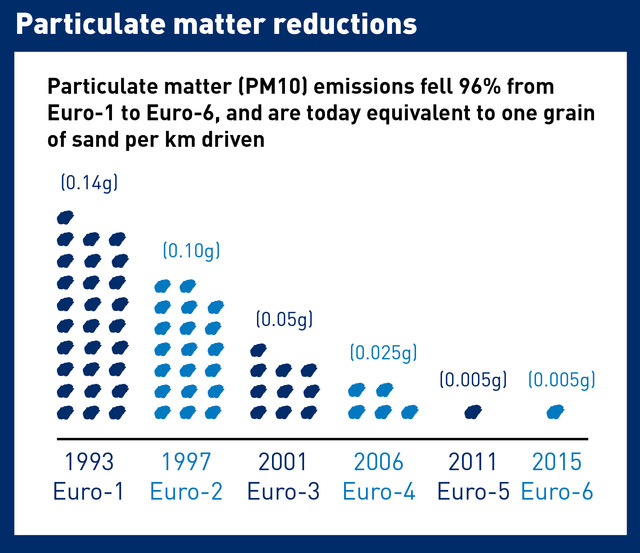
To be fair, the industry has done a great deal already, having made attempts to reduce both particulate matter and harmful emissions in diesel engines over the past few years.
According to the SMMT, the UK is leading the way in Europe in terms of improving emissions standards, with the government offering an impartial test of many new cars which go on sale in the country to verify the manufacturers’ claims.
However, the SMMT also acknowledges that the current method of testing for emissions, which involves laboratory conditions which often bear no semblance to real-life driving, is “outdated and… does the industry no favours”.
The ICCT also says that the technology to make clean diesel cars already exists, but that it’s not being used consistently by car manufacturers. According to Transport & Environment, this is simply a matter of cost: carmakers can save around £220 per car by not fitting additional clean technologies.
What’s the government doing about it?

Regulators from the EU are currently in discussions with car manufacturers to address the way that they test cars in order to bring them more into line with real-world use.
While the EU wants these tests brought into force by 2017, they need the agreement of all member states within the Union, and manufacturers themselves would also prefer more time. Bizarrely, however, the new limits are in fact likely to be less stringent than the current ones in order to reflect real-world applications.
In the meantime, individual countries, including the UK, are beginning to take action, with Britain spurred on after the country could potentially face hefty fines if it doesn’t bring NO2 levels to heel by 2020.
In response, the government launched a consultation document last weekend in order to explore and tackle the issues, with diesel drivers in London, Birmingham, Southampton and other areas potentially being disallowed to drive into city centres.
London Mayor Boris Johnson has also already announced that diesel-powered cars will face charges of an additional £12.50 on top of the existing £11.50 congestion charge if they fail to meet emissions standards by 2020.
Other ideas batted around by the government include taxing owners of vehicles with diesel engines more than those who own vehicles powered by other fuels or sources, though the discussion is still ongoing.
Should I buy a diesel car?

It’s hard to tell what the fate of diesel drivers will be as it ultimately depends on how heavy-handed the government decides to be on owners of vehicles powered by a diesel engine.
As a general rule of thumb, diesels need to be driving for extended periods of time to achieve the optimum temperature for their particulate filters to work. This, coupled with a diesel engine’s better economy over distance, means that diesel cars are best suited to long-distance drivers.
For anybody who regularly drives in a city or other urban areas, or who only uses their car for short journeys and small amounts of time will be better off with a petrol, electric or hybrid car. For more information, check out our guide to which fuel option is best for you.
